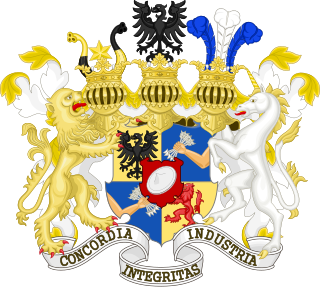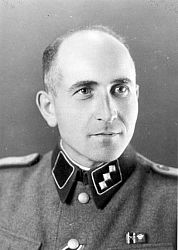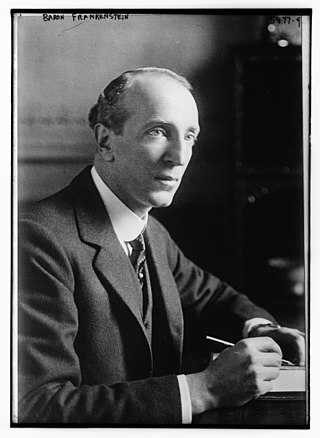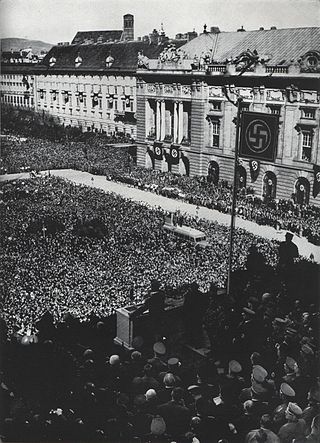
Paul Zsolnay Verlag is an Austrian publishing company.

Paul Zsolnay Verlag is an Austrian publishing company.
The company was created in 1923 by Paul Zsolnay. [1] It was the most successful publishing company during the interwar period, publishing authors such as John Galsworthy, H. G. Wells, Pearl S. Buck, A. J. Cronin, Franz Werfel, Felix Salten, Robert Neumann, Roda Roda, Hilde Spiel, Ernst Lothar, Mela Spira Hartwig, Hans Kaltneker, Friedrich Torberg, Leo Perutz, Heinrich Mann, Kasimir Edschmid, Carl Sternheim, Emil Ludwig, Walter von Molo, and Frank Thiess. [1]
After Austria's Anschluss with Nazi Germany in 1938, the publishing house's owner, Paul Zsolnay, was subject to Nazi anti-Jewish restrictions. After initial attempts to "trick" the Nazis by utilizing an “Aryan” titular head to his firm, he fled to London. The Gestapo closed the publishing house in April 1939, until the non-Jewish bookseller Karl H. Bischoff took over. [2] [3]
In London, Zsolnay worked for the British publisher Heinemann, helping to set up the imprint Heinemann & Zsolnay. Paul Zsolnay lived in England from 1938 to 1946. [1]
When Zsolnay returned to Vienna in 1946, he recovered the business and renamed it the Heinemann & Zsolnay Verlag, [1]

Karl Renner was an Austrian politician and jurist of the Social Democratic Workers' Party of Austria. He is often referred to as the "Father of the Republics" because he led the first government of the Republic of German-Austria and the First Austrian Republic in 1919 and 1920, and was once again decisive in establishing the present Second Republic after the fall of Nazi Germany in 1945, becoming its first President after World War II.

Arthur Seyss-Inquart was an Austrian Nazi politician who served as Chancellor of Austria in 1938 for two days before the Anschluss. His positions in Nazi Germany included deputy governor to Hans Frank in the General Government of Occupied Poland, and Reichskommissar for the German-occupied Netherlands. In the latter role, he shared responsibility for the deportation of Dutch Jews and the shooting of hostages.
The Austrian resistance was launched in response to the rise of the fascists across Europe and, more specifically, to the Anschluss in 1938 and resulting occupation of Austria by Germany.
Carl Szokoll was an Austrian resistance fighter involved in the 20 July Plot, major in the Wehrmacht, and, after the war, author and film producer.
André Deutsch was a Hungarian-born British publisher who founded an eponymous publishing company in 1951.

The Rothschild banking family of Austria was the Austrian branch of the Rothschild family. It was founded in 1820 by Salomon Mayer von Rothschild in Vienna, which was then part of the Austrian Empire.

Louis Nathaniel, Baron von Schwartz de Rothschild was an Austrian Baron from the Rothschild family.

Maximilian Grabner was an Austrian Gestapo chief in Auschwitz. At Auschwitz he was in command of the torture chamber Block 11, where he gained a reputation of brutality. He was executed for crimes against humanity in 1948.

Georg Albert Maria, Freiherr von und zu Franckenstein, known as Sir George Franckenstein, was an Austrian diplomat and a member of the Franckenstein family. Opposed to the Nazis, he became a British citizen when his post was suppressed in 1938.

Karl-Markus Gauß is an Austrian contemporary writer, essayist and editor. He lives in Salzburg.

The Anschluss, also known as the Anschluß Österreichs, was the annexation of the Federal State of Austria into the German Reich on 12 March 1938.

Theodor Kramer was an Austrian poet of Jewish origin. He was persecuted during the Second World War and fled to the United Kingdom. After his death his significant poetic output fell into obscurity, but has been rediscovered in recent decades. Several of his poems have been set to music.
Hermann Erben was an Austrian physician who served in the German military intelligence. He is also known as friend of Errol Flynn.

The Federal State of Austria was a continuation of the First Austrian Republic between 1934 and 1938 when it was a one-party state led by the conservative, nationalist, corporatist and clerical fascist Fatherland Front. The Ständestaat concept, derived from the notion of Stände, was advocated by leading regime politicians such as Engelbert Dollfuss and Kurt Schuschnigg. The result was an authoritarian government based on a mix of Italian Fascist and conservative Catholic influences.
Rudolf Mildner was an Austrian-German SS-Standartenführer. He served as the chief of the Gestapo at Katowice and was the head of the political department at Auschwitz concentration camp, conducting "third degree" methods of interrogation from March 1941 until September 1943. As such, he frequently sent prisoners to Auschwitz for incarceration or execution. He visited Auschwitz on several occasions. In December 1944, he was appointed chief of the SiPo, Gestapo and SD in Vienna. After the war, Mildner testified at the Nuremberg Trials and remained in custody until 1949.
The Austrian SS was that portion of the Schutzstaffel (SS) membership from Austria. The term and title was used unofficially. They were never officially recognized as a separate branch of the SS. Austrian SS members were seen as regular personnel and they served in every branch of the SS.

German nationalism is a political ideology and historical current in Austrian politics. It arose in the 19th century as a nationalist movement amongst the German-speaking population of the Austro-Hungarian Empire. It favours close ties with Germany, which it views as the nation-state for all ethnic Germans, and the possibility of the incorporation of Austria into a Greater Germany.

Arthur Ernst Rutra, born Samuely, was a leading Austrian Expressionist playwright and author. He was also a publisher and journalist. He was born on 18 September 1892 in Lemberg in Austria-Hungary now Ukraine and was murdered on 9 October 1942 in the Maly Trostinets extermination camp near Minsk.
The Holocaust in Austria was the systematic persecution, plunder and extermination of Jews by German and Austrian Nazis from 1938 to 1945. Part of the wider-Holocaust, pervasive persecution of Jews was immediate after the German annexation of Austria, known as the Anschluss. An estimated 70,000 Jews were murdered and 125,000 forced to flee Austria as refugees.
Galerie Würthle was an Austrian art gallery, aryanized under the Nazis, that existed from 1881 to 1995.
The Paul Zsolnay Verlag had been one of the most successful publishing houses in Viennaduring the interwar years. Owner Paul Zsolnay had tricked the Nazis for a short while after the Anschluss by utilizing an "Aryan" titular head to his firm, and in 1938, he fled to safety in London. Despite his efforts and those of his gentile colleague, the Gestapo investigated his business and closed his shop in April 1939, and the bookseller Karl H. Bischoff eventually took over the Paul Zsolnay Verlag.39 In London, Zsolnay worked for the British publisher Heinemann, where he advanced quickly and eventually helped set up the imprint Heinemann & Zsolnay. When he returned to Vienna in 1946, he regained his business and renamed it the Heinemann & Zsolnay Verlag